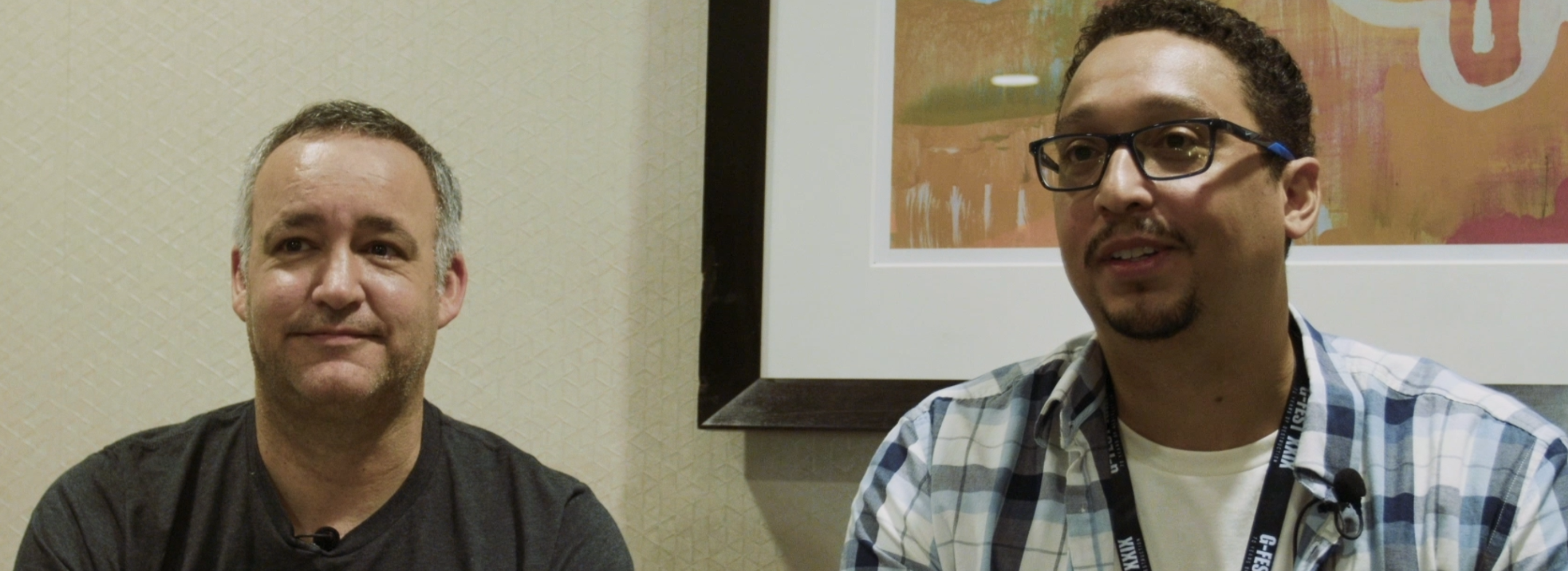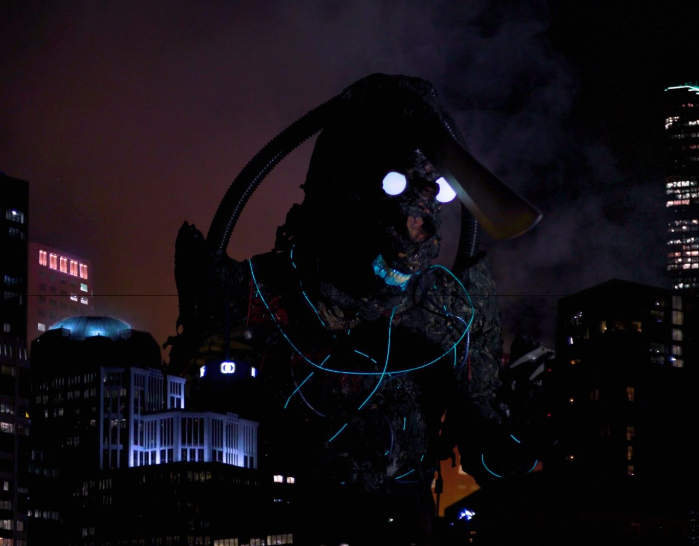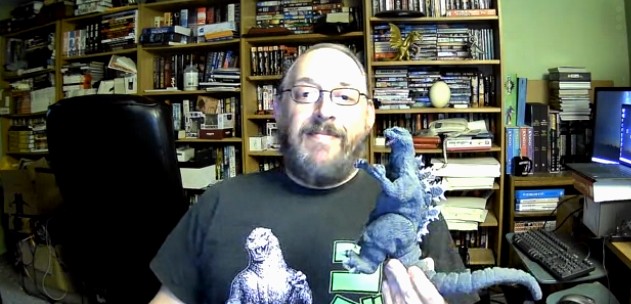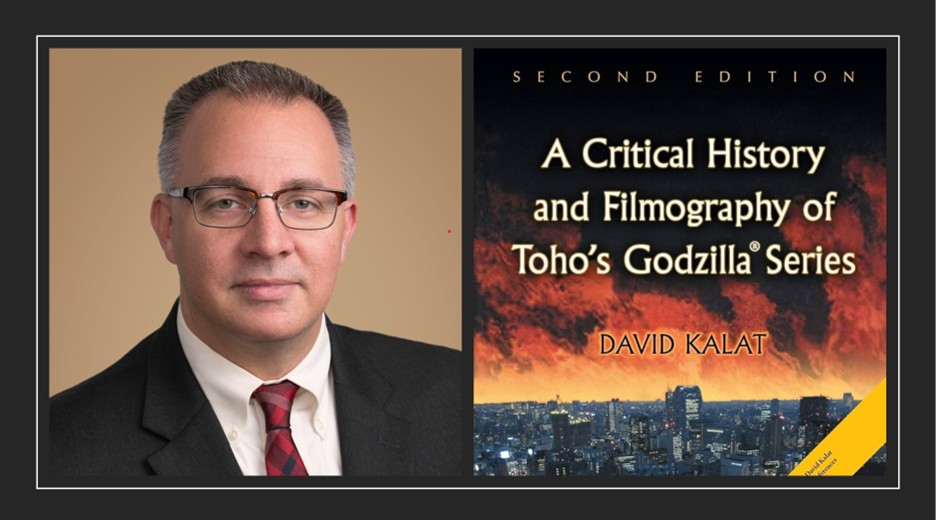Bloodspawn is an independent period piece creature feature co-directed, written, and produced by David Rotan & Derek S. Campbell. Playing all around the country at various film festivals, audiences got their first look at the film during the G-FEST Film Festival in July. After the test screening, Kaiju United got a chance to sit down with the visionaries behind the film to get an insight into their process and the challenges behind independent filmmaking. Below is a written transcript and a watchable video version of our interview with David and Derek.
Additional information can be found on the film’s official website.
Elijah Thomas
Where did the interest in adapting the legend of Uktena come from?
David Rotan
(To David) When *did* we first come up with that?
Derek S. Campbell
That’s a pretty good question. I knew we were looking around for some inspiration, you know, for a movie, and we knew we wanted to do something in the Creature Feature space. We wanted to do something different, something fresh and authentic. And then I think, David, you stumbled upon the lore first.
Derek S. Campbell
Yeah, I looked into some Native American monster mythologies. I grew up in western North Carolina, not far from the Eastern Band of the Cherokee Nation. We stumbled across Uktena, which is not widely known at all. I believe there’s maybe been some mention of Uktena in a few TV shows, and maybe a few smaller movies & short films. But yeah, this is the first feature that I’m aware of that features the Uktena.
Elijah Thomas
What was the process like in designing your iteration of this legendary creature?
David Rotan
We really wanted to try to be authentic and stick with the actual Cherokee description of the monster. Of course, there are some, you know, variances in that. It’s a folklore, a folk legend. And you know, the nature of folk stories like that is they change over time; they’re flexible. It’s not the same description in different retellings. For instance, in some versions, the Uktena has feathers all the way down instead of scales. In others, it has arms, like we chose to depict in our movie. Some other adaptations may just depict it as a serpent, just a snake with wings like a dragon.

Elijah Thomas
Now, in the film, it very much has a style that is like a retro movie. Obviously, the film was shot on digital, but it’s very obvious that there was a filter, or something put over to emulate that. And it’s, it’s really good. What was that like? Where did that decision come from?
David Rotan
Well, we’re children of the 80’s, so we grew up on that. We watched a lot of monster movies back in the day, right before digital hit with Jurassic Park. We especially watched lower budget, straight to VHS monster movies that were all done with stop-motion or puppets, miniatures. Gremlins style, you know. Funny enough, we didn’t originally set out to do it this way. But even while we were shooting the movie, we discussed it with some of our actors. When we told Bill Oberst Jr, we’re thinking about going a more practical route with the monster, he was like, “Oh, no, you have to do it.”
David Rotan
He really pushed us into that route, of going practical. We also explored stop motion, but that is so expensive and time consuming. We just couldn’t do it on this budget for six and a half minutes of monster, which is the amount of screen time we have in the movie. So we went with the next best thing, miniatures like Return of the Jedi and the Rancor. We had a really talented artist in Mexico City, Luis Orozco Perez, who created the puppets for us. And we also had Pete Gerner, who’s a really good special effects artist and makeup artist. He did the tail and the talon for the close ups whenever the tail was swinging or coming through the roof of the cabin. So, yeah, we had a good team of practical effects builders, and then we all jumped in and did some puppetry ourselves. Derek was directing that stuff, and I was actually wearing a green screen suit and moving puppets around.
Derek S. Campbell
It’s that overall feel and vibe. We love that 80’s aesthetic. Even more than just the effects, we wanted to lean in with the audio track as well. So, we leaned into that synthy 80’s kind of sound, you know. We just went for it and hoped that the audience would get it.
David Rotan
Craig Budde is our associate producer and the composer, and he just nailed it with that 80’s sound.
Elijah Thomas
Speaking of the special effects, how did you do the compositing and getting the special effects in with the live action drama sequences with your actors?
Derek S. Campbell
At this point, we already had all the footage in the can, so what we did was take all the six minutes of [monster] footage and chopped them up, scene by scene – each individual shot that it was in, and then had those ready in our green screen studio. And we had our we had David and our other VP there to try to animate the puppet over top of the live action footage. There was a playback monitor, and we just tried to make sure that it matched the live-action footage. And then, we just took copious notes and then mashed them up, scene by scene. After that was done, we jumped into the digital process of rotoscoping, compositing, keying out and laying in things to try to make it blend in a little bit more.
Elijah Thomas
Now, in all films, going from script to screen usually isn’t 100% translated to what is on script. Was there anything from the script that didn’t make it into the final version of the film?
David Rotan
Yeah, there was! The nature of low budget films, you know. We, we shot this in nine days. (laughs)
Derek S. Campbell
(To Elijah) That’s the right reaction! (laughs) It was insane. It was a whirlwind of a time.
David Rotan
There were some pages that had to get cut. It was a spur the moment, the sun’s going down, and we’ve got to get the scene made type scenario. We did have to cut some pages and figure out a way to stitch it together, so it made sense and we’re not losing our plot. So, yeah, we did some of that. The movie itself has a shorter run time than a lot of features, but it’s a healthy 76 minutes.

Derek S. Campbell
I mean, there’d be a time, probably midway through the day, where you’re looking at the shot list, like hmm…we’re not going to make it. Let’s have a powwow and figure out how we can consolidate. What can we chop to keep things moving?
David Rotan
Which is really tricky when you’re dealing with effect shots because you have to get those a certain way and locked down.
Elijah Thomas
Is there a specific scene you can mention that got cut that you wish you could have included?
David Rotan
I don’t think we cut any scenes entirely. We just cut parts of longer scenes. Typically, if we’re going to cut, it’s going to be the talkie talk scenes where there’s a lot of talking in the cabin or right after. We don’t want to give anything away, but right after a big encounter with the monster in a field, there was a lot of back and forth with the characters, arguing about what to do next. And we could chop that easily. So we chopped about two pages out of that scene. Honestly, we didn’t lose any scenes. We just lost a little bit of dialog.
Derek S. Campbell
Our actors were a great help as well; they played a huge part. Many times on set they were like, oh, I don’t know, we could probably get this out of there. I’m not sure that’s totally necessary for the character.” It was a big help, and it was a team effort, trying to figure out what to cut and what to keep.
Elijah Thomas
Speaking of your actors, how did you find your cast?
David Rotan
Two of them are Keith Harris and Roger Willie, and I had worked with before on previous films, such as Lost Stallions: The Journey Home. Both of them were in that. And then, I had worked with Keith in the pirate Kids series that I did a kid series. For Raw [Leiba] and for Bill Oberst Jr… Bill is pretty well known in the indie horror world, so I connected with him, and I believe Raw was through slated.com connections. They’re [Slated] actually credited in the film, so that’s where I connected with them and got them on board. They were really excited about the project.
Elijah Thomas
How did you balance the comedic elements with the more violent or story-driven moments of the film?
Derek S. Campbell
We always wanted it to be campy and tongue in cheek, a little funny, but also mixing in moments of shock and satisfaction when the when the monster attacks. It was just something that we kind of leaned into from our influences as 80’s kids. For instance, one liners are always something that we just had to put in there.
David Rotan
Yeah, there were a few one liners. And, you know, one of our mantras when we were putting everything together was embracing the camp. Just embrace the camp. A movie like this is supposed to be fun, so we went with it. Now, we did put a lot of time and attention to trying to be authentic with the Uktena legend and all of that. In that regard, we had the actors play everything straight. I think that makes those moments with a little bit of humor and comedic relief even more powerful.

Elijah Thomas
You’ve emphasized your influence from the 1980’s era. Is there any particular film or project that directly influenced this film?
Derek S. Campbell
I wouldn’t say it was any in particular. We really wanted to nail the aesthetic from the time period as a homage to the grindhouse feel of the 70s and 80s. That feeling we wanted to shine through everything – the music, the tone, and even in the scripting. That one-liner writing is something that you don’t see much of these days. I hope it’s not too much of a spoiler, but there’s a scene where a character is torn to pieces…
David Rotan
…it’s just natural to say a one-liner: “I knew that guy would break under pressure!” (laughs)
Elijah Thomas
Something that I really found interesting about the film is it’s a period piece. Where did that thought process come in, and what were some of the challenges to overcome with having it set in the past?
David Rotan
I just think the nature of the legend of Uktena just lends itself to being a period piece and set in the past, especially since this is a Cherokee monster. The Trail of Tears is a very infamous period of time – it’s a period of upheaval and horror. If anything’s going to unleash this monster upon the people according to the legend, that would be a time period to do it.
Derek S. Campbell
The time period didn’t come without its challenges in production, of course. One, of course they all had horses at that time, so you gotta write those out. (laughs)
David Rotan
Yeah, we’re low budget! (laughs) I’ve done a horse movie, so I never wanted to deal with horses again – especially on a low budget 9-day shoot. Because of that, we intentionally wrote it so that they lost all of their horses, or they were killed.
Derek S. Campbell
Yeah, exactly. The next thing is that the movie takes place in a cabin, so we had to locate a cabin that was authentic enough inside and out to represent the time period. That was a challenge! We had to lay in a little bit of effects to sell it all the way… but overall it was a blast! The costuming was something we wanted to make as authentic as can be. We tried to make every detail authentic, such as the weapons that aren’t the fantastical steampunk armory they find later on.
David Rotan
We had fun! Even though it was a period piece, I’m proud of what we did on our limited budget and schedule.
Elijah Thomas
What’s the plan around releasing this film, so people can watch it in the future?
David Rotan
We’ve signed with Red Owl Films, a distribution wing of Black Mandala Films. They’re based in New Zealand, but Red Owl is going to put this out in North America and The UK hopefully sometime near the end of 2024. They’re also acting as international sales agents for our film in all other markets worldwide.
Elijah Thomas
Thank you for sitting down with me.
Bloodspawn just had a screening with the cast at the Arlington Cinema & Drafthouse in Virginia on October 30. It will play there again Saturday, November 2. The cast & crew will be in attendance.
Other screenings include:
Grindhouse Planet Film Festival | November 16, 2024
Big Apple Film Festival | December 10, 2024
Horror-on-Sea Film Festival | January 17, 2025





